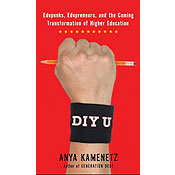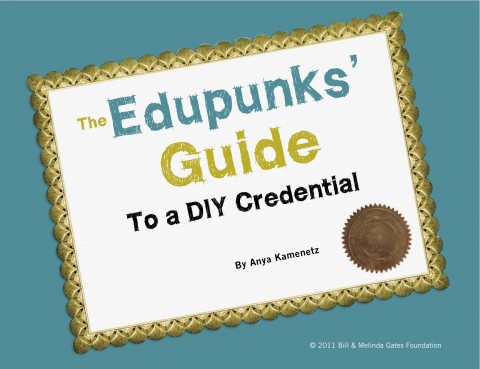http://marketplace.publicradio.org/display/web/2011/09/16/mm-how-to-diy-a-degree/
How to DIY a degree
Marketplace Money, Thursday, September 15, 2011
A bachelor's degree is almost a requirement to enter the middle class these days. But author Anya Kamenetz thinks that people can cobble together a "DIY degree" with a little ingenuity and hard work.

"DIY U: Edupunks, Edupreneurs, and the Coming Transformation of Higher Education" by Anya Kamenetz. (diyu.com)

Writer Anya Kamenetz. (Diana Levine).
TESS VIGELAND: So much for getting a good deal on education at a state school. Good lord. This week the University of California laid out a budget plan that could raise tuition -- just tuition -- to more than $22,000 by the 2015 school year. So what if you could get the benefits of college, at least some of them, without the price tag?
Anya Kamenetz is a senior writer for Fast Company and the author of the new FREE e-book called "The Edupunks' Guide to a DIY Credential." Anya, what's the problem with college?
ANYA KAMENETZ: Well, the problem is that there are millions and millions of people out there who want access to a college education, who have the ability to take advantage of a college education but they do not have that access. Either because of money, because of time, because of other responsibilities -- and that's who this guide is for.
VIGELAND: So essentially, you're just saying, Look, college does not have to be the only option for you to be a success in your life. But haven't we known that all the way along?
KAMENETZ: Well, we may know that in our hearts and in our minds, but the fact is, in this economy, it is very very hard to join the middle class without some kind of credential past high school. And there just isn't enough capacity in our public systems. They have been dealing with year after year of budget cuts and, you know, there's not a lot of resources out there. So I think people need to start figuring out other paths to get that degree.
VIGELAND: What exactly is involved in that DIY degree? What do you do for it and what do you get out of it?
KAMENETZ: So what I'm encouraging people to do is put together a personal learning plan, which includes their personal goals. And once you've determined what it is that you want to do, it may be that you want to get a certification or a license, which could mean taking a private course or taking a course at a community college, and then sitting in an exam and passing an exam. If you want to get credit for your life experience, you can put together a portfolio and there's a national program calledLearningCounts.org, which shows you how to do a six-week class to put together a portfolio, which is the narrative of your learning that you've gotten from military training or job training or volunteering or traveling -- and put that all towards a degree. And then there are colleges and universities -- like Excelsior, Empire State, Charter Oaks State College -- and these are all public universities that specialized in helping people take their prior learning experience and put them towards a personally designed learning plan.
VIGELAND: Let me play devil's advocate here though: You know, a DIY credential is nice and all, but you've got this incredibly cutthroat job market out there right now. How is this going to help someone make the cut, to stand out against someone like you, a Yale grad; someone who went to a state school, a community college even?
KAMENETZ: I think that the key ingredient is that individuals are taking charge of their own learning and they're connecting their goals within the classroom to a goal outside the classroom. And that's why the guide includes tutorials for people to start to create and build their personal learning network, to find a mentor, to connect to a community. People are not getting hired because of a paper resume or because of their transcript or their diploma. They're getting hired because they can demonstrate value.
VIGELAND: But that doesn't sound true. I feel like we are actually hearing the opposite, that if you don't have a resume and an education that is going to make you stand out from everybody in the field, it's just going to get dumped in the trash. I mean, it's so competitive.
KAMENETZ: So what does it really mean to stand out? I mean, I profile, for example, a community of programmers called GitHub. And GitHub was started just as a place for people to collaborate on open source software projects. And the languages that are being used in that community to program in -- languages like Python, Java, PHP -- these are not being taught in our computer science programs. Our computer science programs can't keep up. And there are companies like Twitter and Apple that are recruiting directly off of GitHub. And this is really the new credential. A resume is a dead piece of paper, unless you can connect it to something that really demonstrates what you can do and how you can do it. You know, a credential is nice, it's important, but it is not sufficient anymore.
VIGELAND: Anya Kamenetz is the author of the new e-book, "The Edupunks' Guide to a DIY Credential." She's also a senior writer for Fast Company magazine. Thanks for coming in.
KAMENETZ: Thanks so much for having me.
Download The Edupunks' Guide to a DIY Credential (Free eBook)
in e-books, Education | August 2nd, 2011 Leave a Comment
 It's hot off the digital press. Anya Kamenetz, a senior writer at Fast Company Magazine and author of DIY U: Edupunks, Edupreneurs, and the Coming Transformation of Higher Education, has teamed up with the Gates Foundation to release a free ebook, The Edupunks' Guide to a DIY Credential.
It's hot off the digital press. Anya Kamenetz, a senior writer at Fast Company Magazine and author of DIY U: Edupunks, Edupreneurs, and the Coming Transformation of Higher Education, has teamed up with the Gates Foundation to release a free ebook, The Edupunks' Guide to a DIY Credential.
The new ebook offers a "comprehensive guide to learning online and charting a personalized path to an affordable credential," and it comes complete with some handy-sounding tutorials: how to write a personal learning plan, how to teach yourself online, how to build your personal learning network, 7 ways to get college credit without taking a college course, etc.
The book also smartly features a long list of open educational resources, where the author was nice enough to give us a small mention.
You can read The Edupunks' Guide to a DIY Credential on Scribd, or alternatively you can download it in multiple formats (PDF, Kindle, ePub, RTF, etc.) at the bottom of this page.
The Edupunks' Guide to a DIY Credential
Ebook By Anya KamenetzRating: Not yet rated.
Published: July 31, 2011
Category: Non-Fiction » Education and Study Guides » College Guides
Words: 28451 (approximate)
Language: English
Ebook Short Description
A first-of-its kind resource for the future of education: a comprehensive guide to learning online and charting a personalized path to an affordable credential using the latest innovative tools and organizations. Real-life stories and hands-on advice for today's students, whether you're going back to school, working, transferring colleges, or pursuing lifelong learning goals.Extended Description
Anya Kamenetz, a nationally recognized educational expert and author of Generation Debt and DIY U, has written the first-ever book sponsored by the Gates Foundation. The Edupunks' Guide is a first-of-its kind resource for the future of education: a comprehensive guide to learning online and charting a personalized path to an affordable credential using the latest innovative tools and organizations. Real-life stories and hands-on advice for today's students, whether you're going back to school, working, transferring colleges, or pursuing lifelong learning goals.Highlights:
*A series of tutorials: How to Write a Personal Learning Plan, How to Teach Yourself Online, How to Build Your Personal Learning Network, How to Find a Mentor, How to Get a Credential, How To Demonstrate Value to a Network.
*The DIY Degree: A Degree At Your Own Pace (18 months to 18 years) at 81% Off Retail
*7 Ways to Get College Credit Without Taking a College Course/7 Ways to Learn College Material Without Tak... (Read more)
Tags
career, college, networking, online, resume, career advice, online education, education higher,education help, online college, college advice, resume buildingAvailable Ebook reading formats:
This book is free.| Format | Full Book |
|---|---|
| Online Reading (HTML, good for sampling in web browser) | View |
| Online Reading (JavaScript, experimental, buggy) | View |
| Kindle (.mobi for Kindle devices and Kindle apps) | Download |
| Epub (Nook, Sony Reader, Kobo, and most e-reading apps including Stanza, Aldiko, Adobe Digital Editions, others) | Download |
| PDF (good for reading on PC, or for home printing) | Download |
| RTF (readable on most word processors) | Download |
| LRF (Use only for older model Sony Readers that don't support .epub) | Download |
| Palm Doc (PDB) (for Palm reading devices) | Download |
| Plain Text (download) (flexible, but lacks much formatting) | Download |
| Plain Text (view) (viewable as web page) | View |
No comments:
Post a Comment